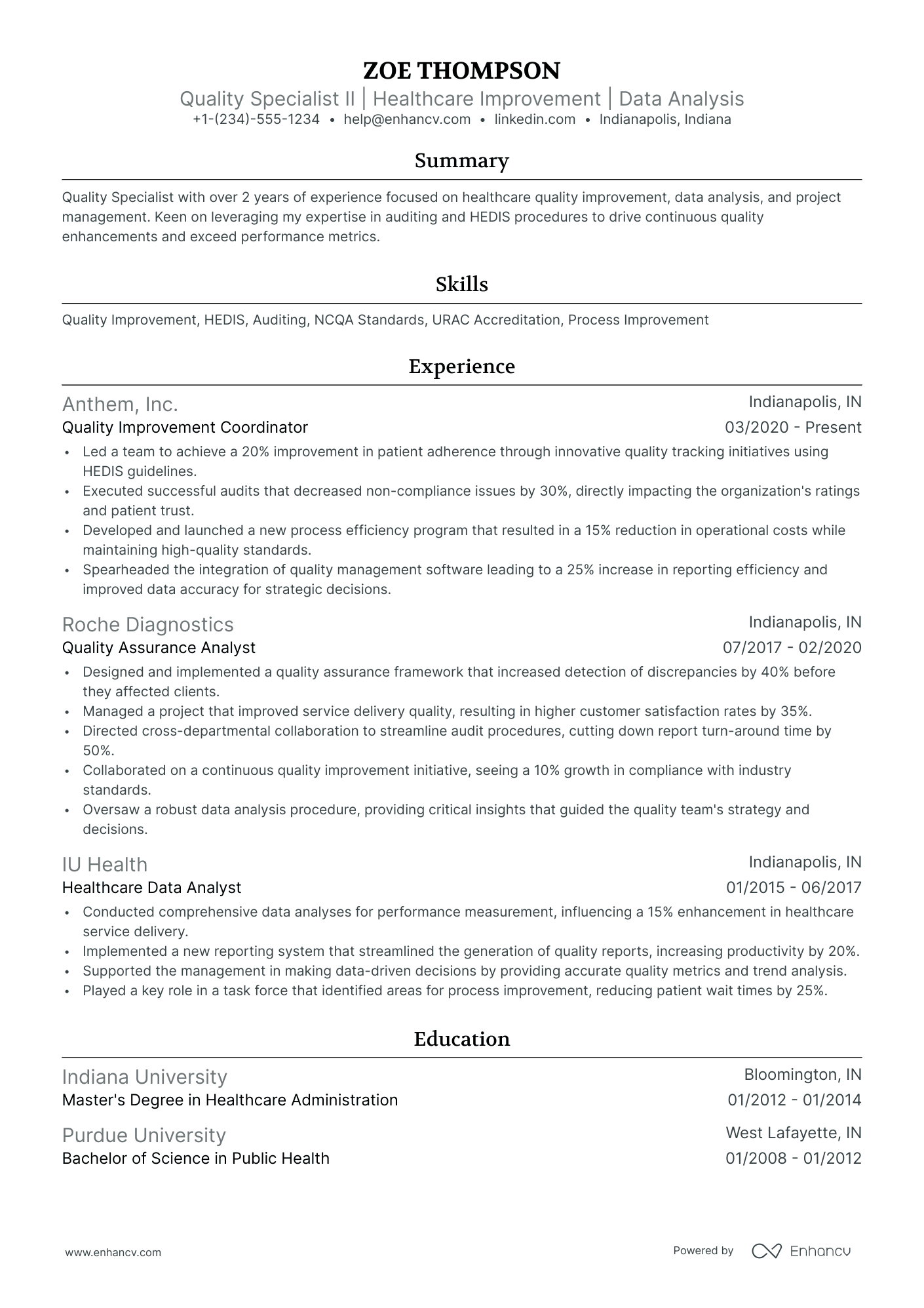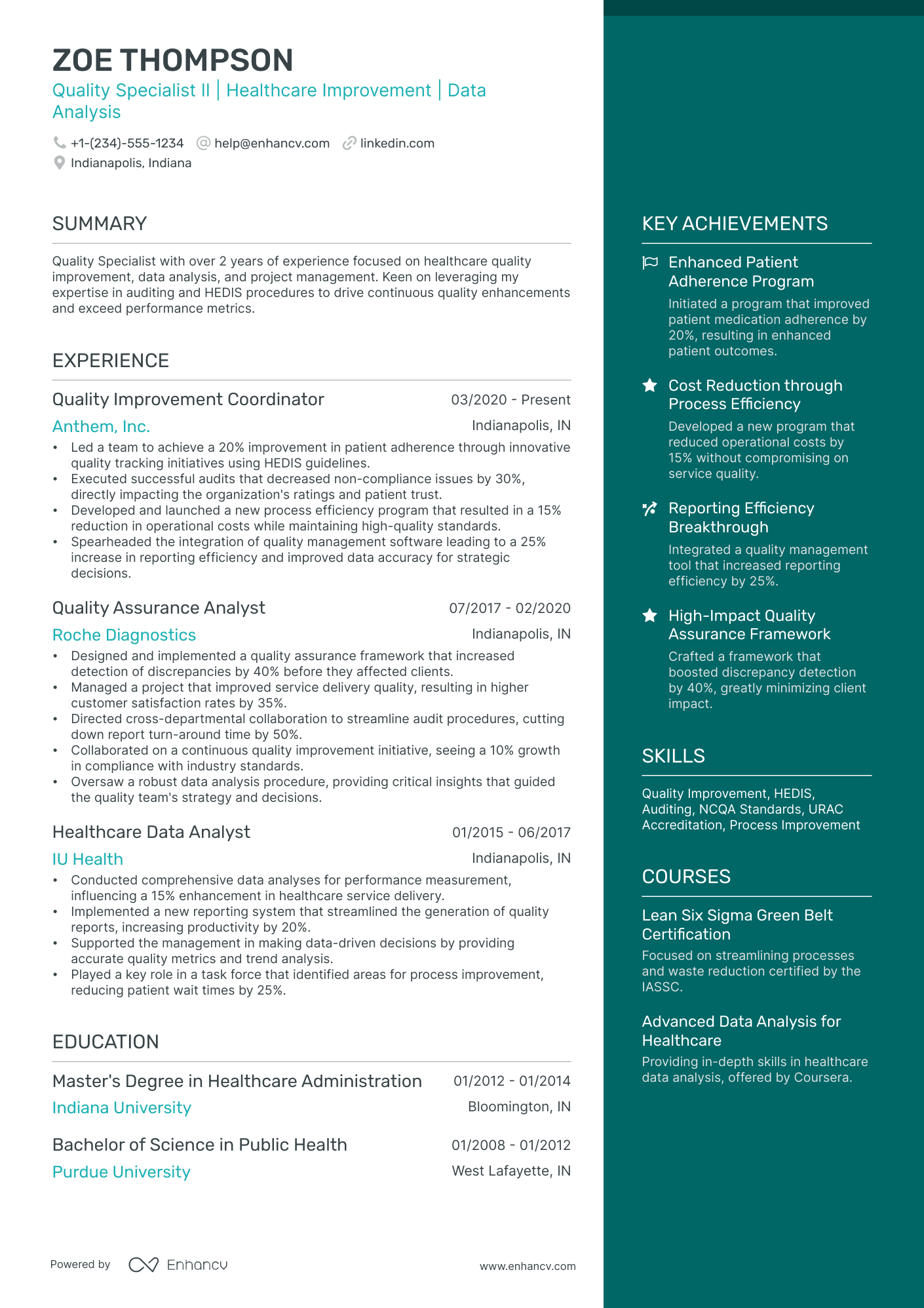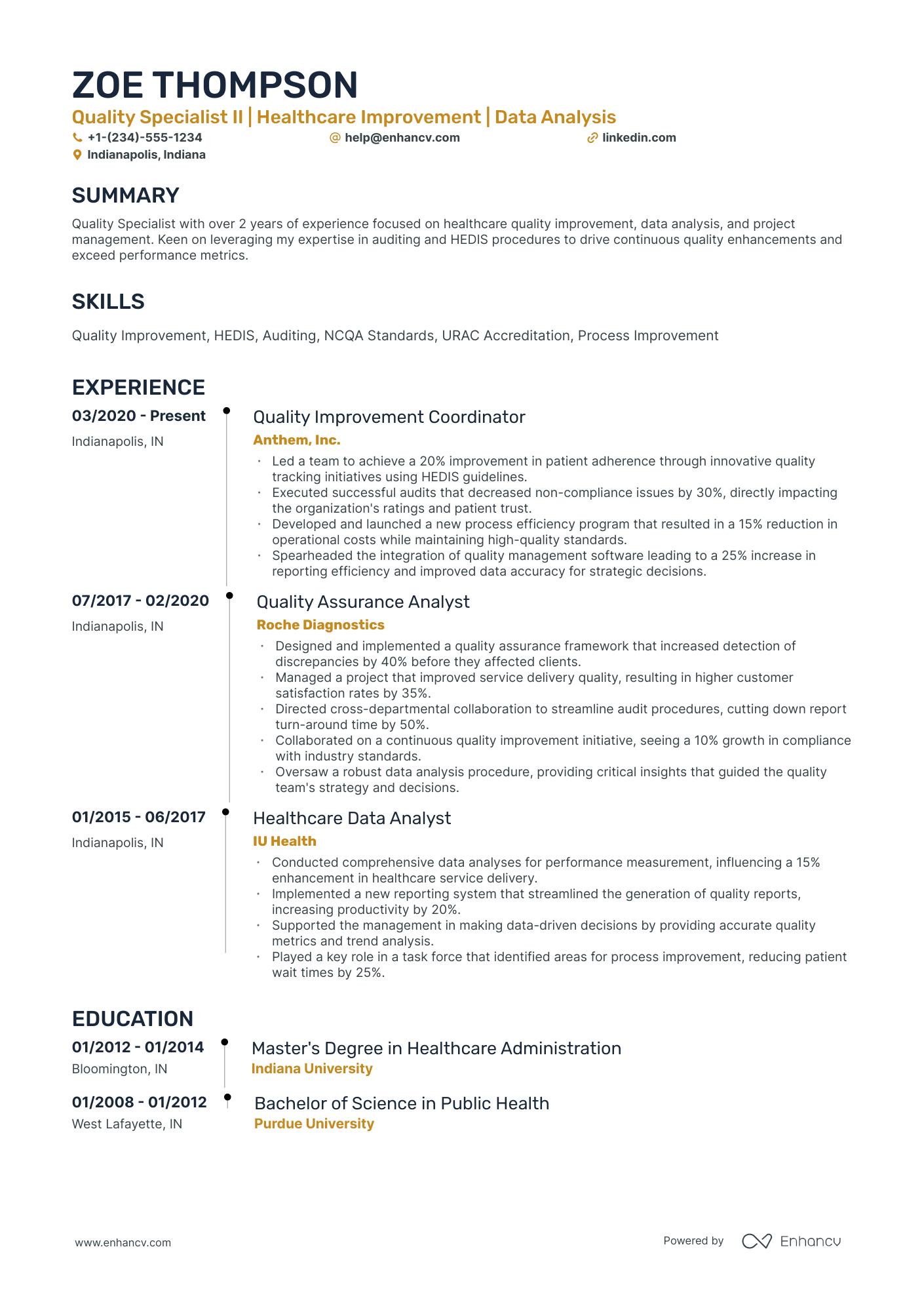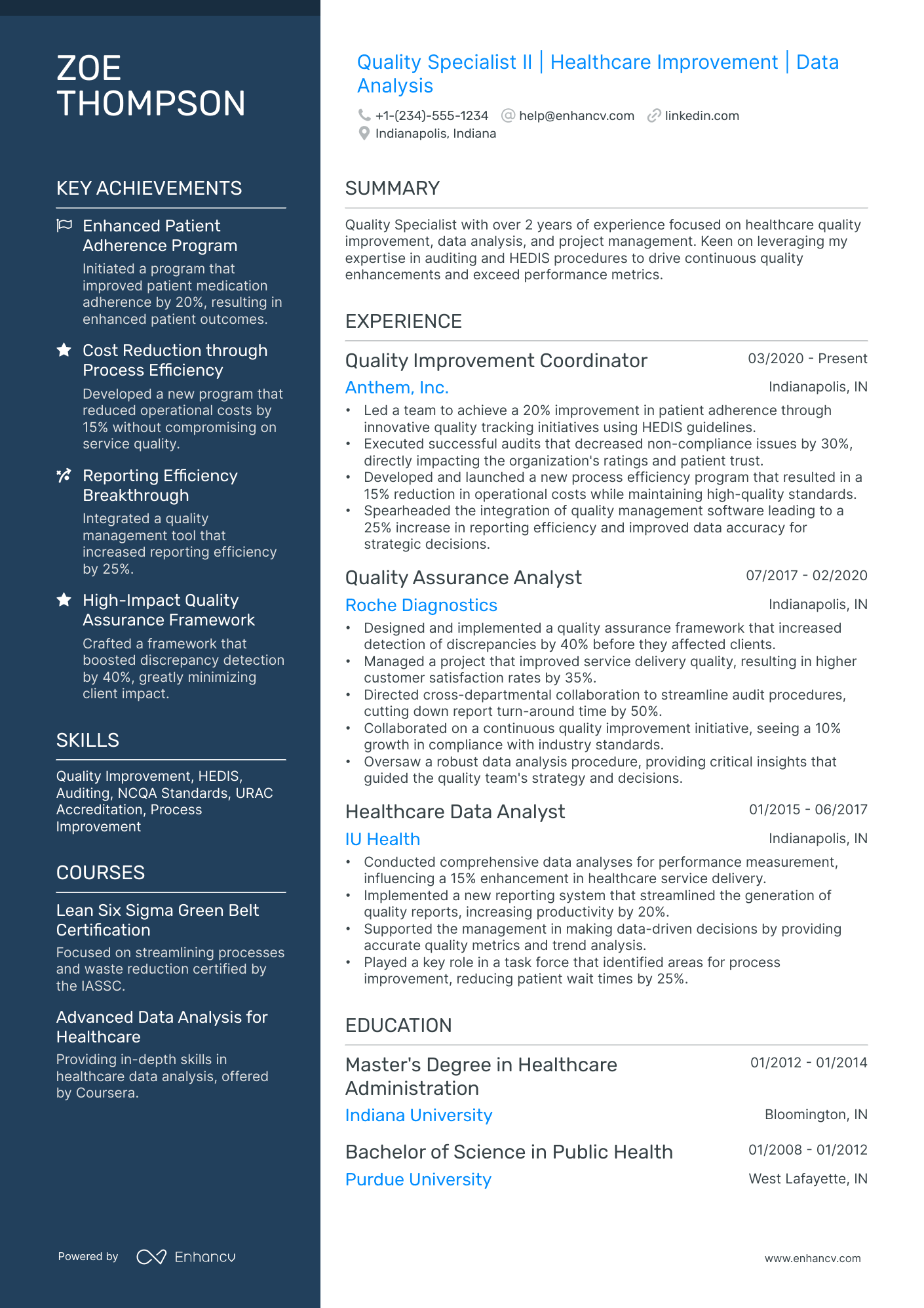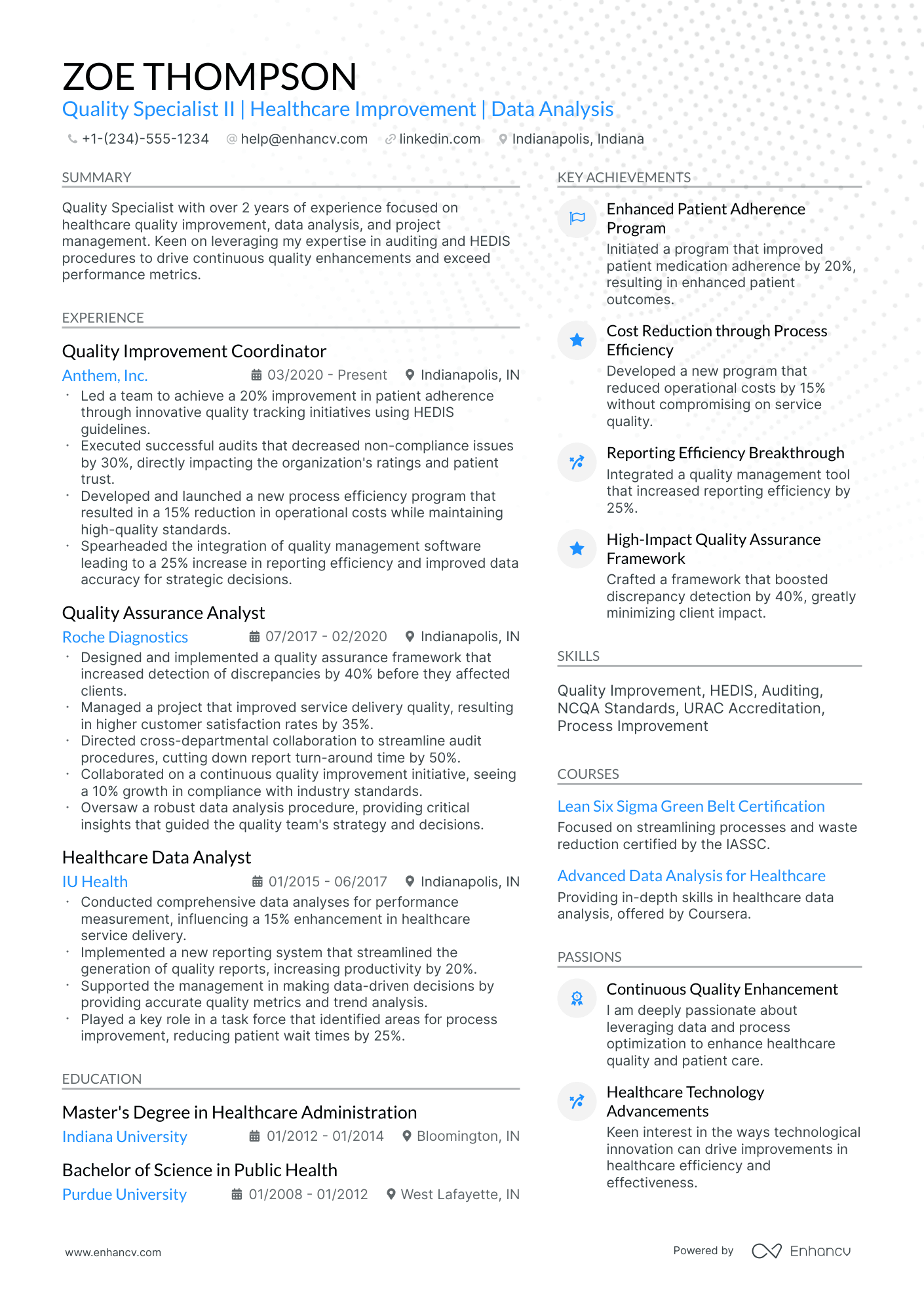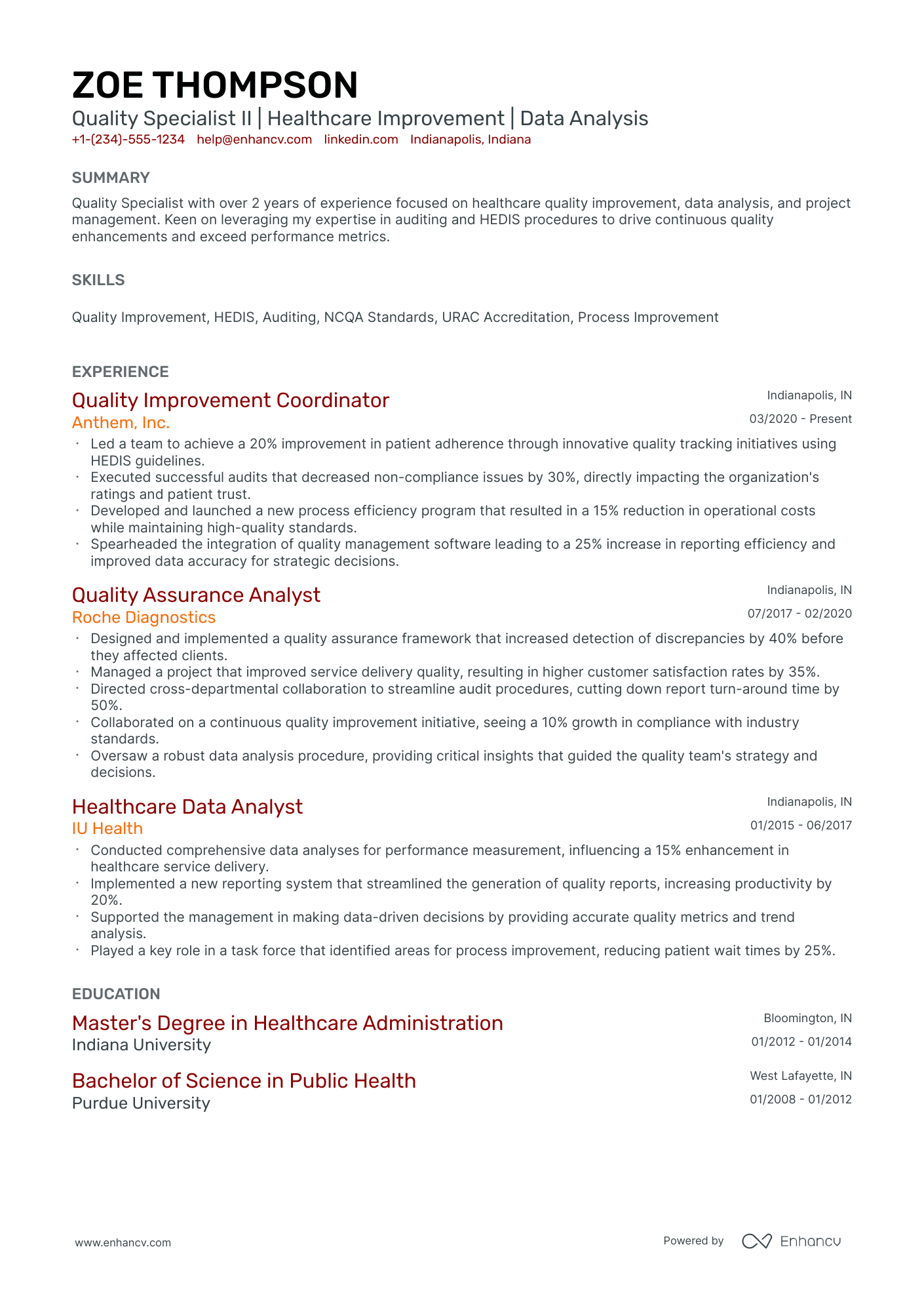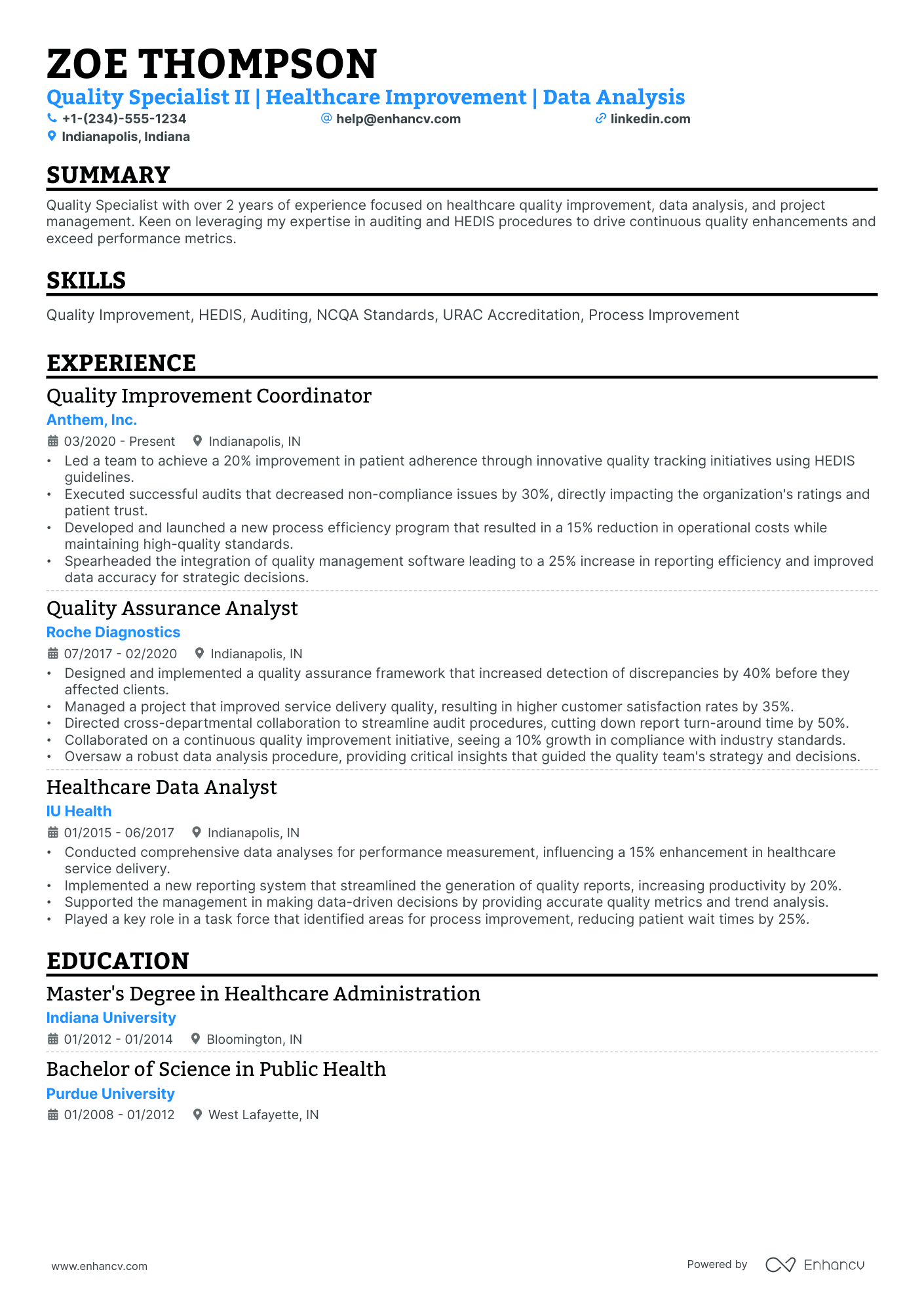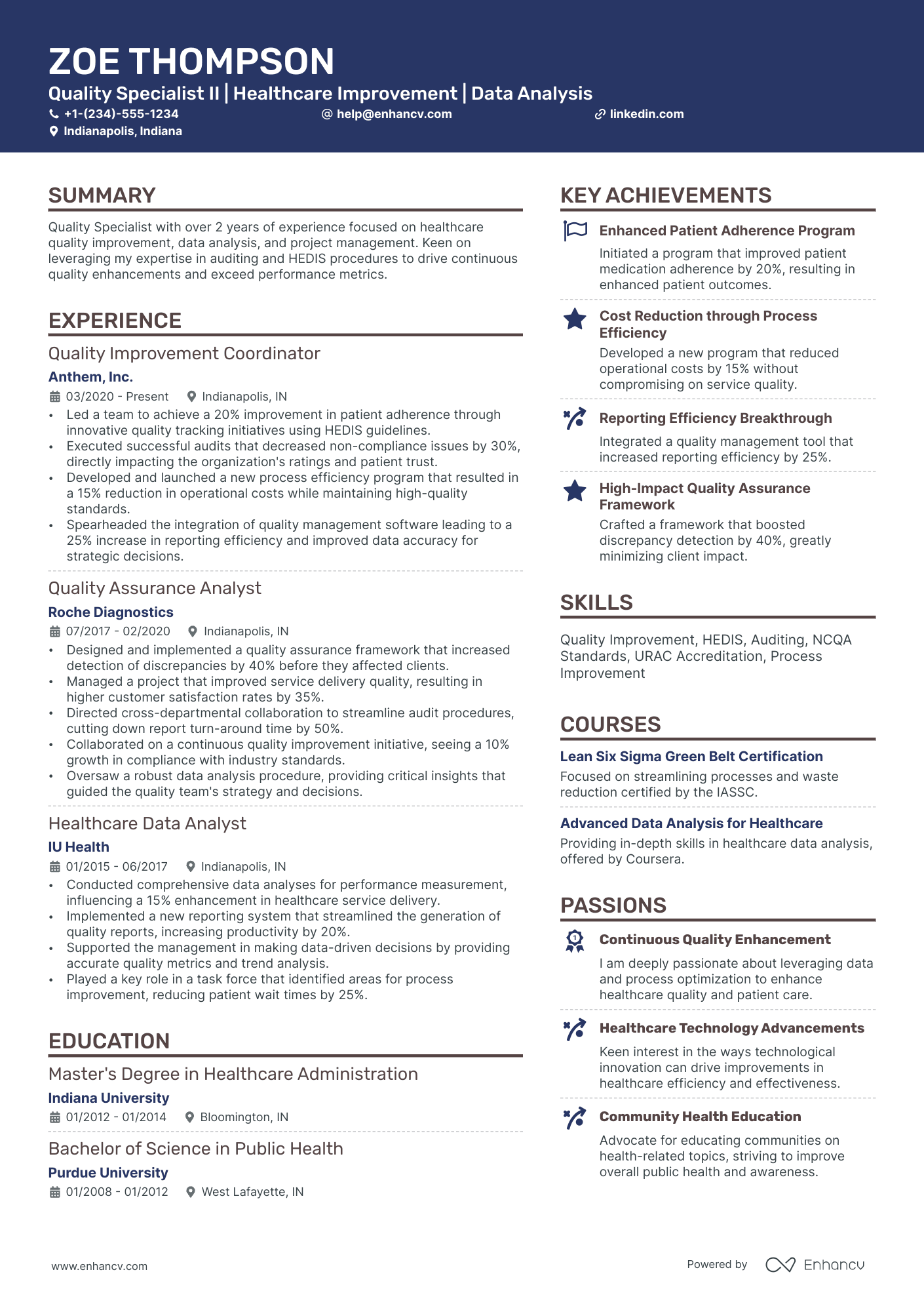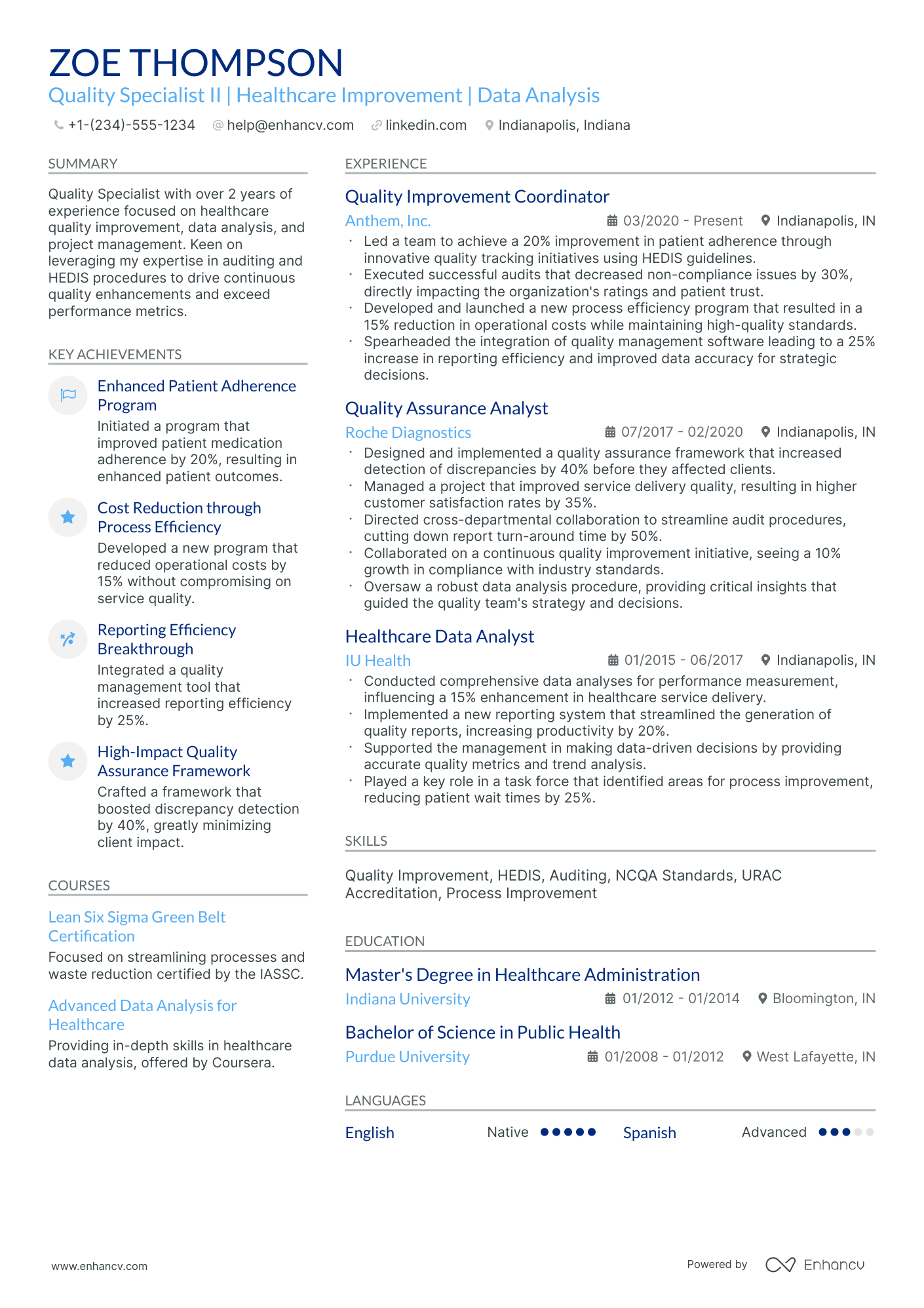As a quality specialist, crafting a resume that effectively showcases your attention to detail and analytical skills can be challenging. Our guide provides tailored strategies that will help you highlight your expertise in quality control and optimize your resume for maximum impact.
- Find different quality specialist resume examples to serve as inspiration to your professional presentation.
- How to use the summary or objective to highlight your career achievements.
- How to create the experience section to tell your story.
- Must have certificates and what to include in the education section of your resume.
If the quality specialist resume isn't the right one for you, take a look at other related guides we have:
- Quality Consultant Resume Example
- Quality Assurance Associate Resume Example
- Quality Control Specialist Resume Example
- Quality Control Engineer Resume Example
- Quality Assurance Auditor Resume Example
- Quality Technician Resume Example
- Quality Assurance Officer Resume Example
- Quality Supervisor Resume Example
- QA Manager Resume Example
- Quality Manager Resume Example
Professional quality specialist resume format advice
Achieving the most suitable resume format can at times seem like a daunting task at hand.
Which elements are most important to recruiters?
In which format should you submit your resume?
How should you list your experience?
Unless specified otherwise, here's how to achieve a professional look and feel for your resume.
- Present your experience following the reverse-chronological resume format . It showcases your most recent jobs first and can help recruiters attain a quick glance at how your career has progressed.
- The header is the must-have element for your resume. Apart from your contact details, you could also include your portfolio and a headline, that reflects on your current role or a distinguishable achievement.
- Select relevant information to the role, that should encompass no more than two pages of your resume.
- Download your resume in PDF to ensure that its formatting stays intact.
Upload & Check Your Resume
Drop your resume here or choose a file. PDF & DOCX only. Max 2MB file size.
PRO TIP
Bold the names of educational institutions and certifying bodies for emphasis.
Ensure your quality specialist resume stands out with these mandatory sections:
- Header - the section recruiters look to find your contact details, portfolio, and potentially, your current role
- Summary or objective - where your achievements could meet your career goals
- Experience - showcasing you have the technical (and personal) know-how for the role
- Skills - further highlighting capabilities that matter most to the quality specialist advert and your application
- Certifications/Education - staying up-to-date with industry trends
What recruiters want to see on your resume:
- Experience with quality management systems (QMS) and associated certifications (e.g., ISO 9001, AS9100)
- Knowledge of quality control tools and methodologies like Six Sigma, Lean Manufacturing, or Kaizen
- Experience in conducting internal and supplier audits for compliance with industry and company standards
- Proficiency in statistical analysis and software (e.g., Minitab, SPC software, or similar)
- Demonstrated ability to drive continuous improvement initiatives and defect reduction strategies
The experience section or the essence of your professional quality specialist resume
Recruiters always have and always will appreciate well-written quality specialist resume experience sections.
The experience section is perhaps the most crucial element of your professional presentation, as it needs to answer job requirements while showcasing your technical expertise and personality.
Create your best resume experience section yet by:
- Selecting only relevant experience items to the role you're applying for;
- Always ensure you've listed a metric to quantify your success alongside each experience item;
- Create a narrative that showcases your quality specialist career succession: this goes to show the time and effort you've invested in the field to build your experience from the ground up;
- Within each experience bullet, consider a problem you've solved, the skills you've used, and the bigger impact this has made in the organization.
Take a look at how other real-life professionals have curated their experience with the quality specialist samples below:
- Spearheaded the implementation of a robust Total Quality Management system, enhancing product consistency and reducing defect rates by 26% over 18 months.
- Championed the development and execution of automated testing procedures which decreased the manual testing efforts by 40% and sped up the release cycles.
- Conducted detailed data analysis to identify the root causes of recurrent quality issues, leading to strategic changes in manufacturing processes that improved overall product quality by 15%.
- Led a cross-departmental initiative to revise and enhance the company’s SOPs, which improved process adherence and reduced quality-related incidents by 33%.
- Managed vendor quality assessments ensuring supplier compliance with industry standards, which improved material quality and reduced rework by 18%.
- Collaborated with the product development team to integrate quality standards into the design phase, reducing the time-to-market for new products by 22%.
- Executed rigorous quality control checks resulting in a 99.7% pass rate for outgoing products thereby maintaining the prestigious status of the company’s ISO 9001 certification.
- Developed a quarterly quality metrics report that tracked defect trends and improved operational decision-making, crediting a 12% increase in efficiency.
- Facilitated comprehensive training programs for 75+ personnel on quality assurance standards and practices, elevating the quality culture within the organization.
- Assisted in the rollout of a digital document management system which improved document retrieval times by 50% and supported regulatory compliance.
- Instrumental in the post-market quality surveillance system, identifying potential risks early and mitigating them effectively to uphold the company’s reputation for safety.
- Conducted internal audits that identified 20+ areas for process enhancement, streamlining operations, and further securing the integrity of the quality management system.
- Orchestrated the transition towards a lean quality system leading to a 15% cutback in operational costs while retaining efficacy in adherence to compliance mandates.
- Guided teams through two major external audits with zero non-conformances, demonstrating exceptional preparation and organizational quality standards.
- Instituted a corrective and preventive action program that was instrumental in the 20% reduction in customer complaints over a span of 12 months.
- Drove the design and implementation of a Six Sigma-based initiative that yielded a 30% improvement in process cycle times across key product lines.
- Oversaw the maintenance and updating of the Quality Management System, aligning it with evolving FDA and international regulations and achieving a 100% audit pass rate.
- Enhanced customer satisfaction scores by 25% through the introduction of a customer feedback loop directly connected to the quality improvement process.
- Facilitated a 40% increase in inter-departmental compliance with quality metrics by developing an interactive dashboard for real-time tracking and management of KPIs.
- Curated a comprehensive quality systems training manual that improved new hire onboarding efficiency by 35% and ensured consistency of knowledge across the board.
- Played a pivotal role in pre-emptively identifying compliance risks related to emerging market regulations, thereby preventing potential fines and brand damage.
- Initiated a successful predictive analytics project that utilized historical data to anticipate quality deviations, decreasing scrap rates by 22% annually.
- Implemented a comprehensive risk management framework that led to a 19% reduction in product liability cases by preemptively addressing potential quality issues.
- Streamlined quality inspection workflows through effective data management strategy, which enabled a 24% improvement in time efficiency of the inspection team.
- Led the validation of new quality testing equipment, which improved testing precision by 18% and substantially reduced manual error in product assessments.
- Established a quality key performance indicator system to elevate awareness and drive improvements, resulting in meeting or exceeding all target goals for three consecutive quarters.
- Reviewed and streamlined the quality complaints process, shortening the average resolution time by 30% and improving customer relations.
- Conducted failure mode and effects analysis (FMEA) on 10+ product lines which informed critical design changes and improved durability by 20%.
- Collaborated with R&D to integrate quality by design principles, resulting in a 25% reduction in late-stage product modifications and associated costs.
- Masterminded the adoption of an agile approach to the QA process, reducing the cycle time of software releases by 50% and improving customer satisfaction scores.
The following content includes information from "O*NET OnLine" by the U.S. Department of Labor, Employment and Training Administration (USDOL/ETA). Used under the CC BY 4.0 license. The data represents the top responsibilities present on the task lists for quality specialist professionals.
Top Responsibilities for Quality Specialist:
- Test selected products at specified stages in the production process for performance characteristics or adherence to specifications.
- Compile and evaluate statistical data to determine and maintain quality and reliability of products.
- Study time, motion, methods, or speed involved in maintenance, production, or other operations to establish standard production rate or improve efficiency.
- Read worker logs, product processing sheets, or specification sheets to verify that records adhere to quality assurance specifications.
- Verify that equipment is being operated and maintained according to quality assurance standards by observing worker performance.
- Aid in planning work assignments in accordance with worker performance, machine capacity, production schedules, or anticipated delays.
- Evaluate industrial operations for compliance with permits or regulations related to the generation, storage, treatment, transportation, or disposal of hazardous materials or waste.
- Adhere to all applicable regulations, policies, and procedures for health, safety, and environmental compliance.
- Analyze, estimate, or report production costs.
- Assist engineers in developing, building, or testing prototypes or new products, processes, or procedures.
Quantifying impact on your resume
- Include specific metrics to demonstrate efficiency improvements in quality control processes.
- List the percentage of reduction in product defects or returns due to your quality initiatives.
- Quantify the amount of saved costs associated with waste reduction or process optimization.
- Detail the number of quality audits conducted and the implementation rate of suggested improvements.
- Highlight the scale of projects managed, in terms of budget, team size, or scope.
- State any increases in customer satisfaction scores that resulted from your quality assurance work.
- Mention certifications earned, such as Six Sigma or ISO, that relate to industry-standard quality management.
- Showcase experience with statistical analysis software or quality management systems through user proficiency levels.
Action verbs for your quality specialist resume
Quality specialist resume without experience: a walk-through guide
If you don't happen to have any relevant experience yet, you can substitute this with:
- Short-term gigs and stunts - like month-long internships, that you have done during your university days
- Contract work - be specific about the relevance and outcomes of each role you include
- Resume format that prioritizes your skills - the functional-skill-based format or hybrid format could work
- Research roles - feature those especially prominently if you've participated in a noteworthy project or your role was of utmost importance to the project's success.
Recommended reads:
PRO TIP
The more time and effort you've put into obtaining the relevant certificate, the closer to the top it should be listed. This is especially important for more senior roles and if the company you're applying for is more forward-facing.
The heart and soul of your quality specialist resume: hard skills and soft skills
If you read between the lines of the quality specialist role you're applying for, you'll discover that all requirements are linked with candidates' hard skills and soft skills.
What do those skills have to do with your application?
Hard or technical skills are the ones that hint at your aptitude with particular technologies. They are easy to quantify via your professional experience or various certifications.
Meanwhile, your soft skills are more difficult to assess as they are personality traits, you've gained thanks to working in different environments/teams/organizations.
Your quality specialist resume skills section is the perfect opportunity to shine a light on both types of skills by:
- Dedicating a technical skills section to list up to six technologies you're apt at.
- Focusing a strengths section on your achievements, thanks to using particular people skills or technologies.
- Including a healthy balance of hard and soft skills in the skills section to answer key job requirements.
- Creating a language skills section with your proficiency level - to hint at an abundance of soft skills you've obtained, thanks to your dedication to learning a particular language.
Within the next section of this guide, stay tuned for some of the most trending hard skills and soft skills across the industry.
Top skills for your quality specialist resume:
Statistical Process Control (SPC)
Root Cause Analysis (RCA)
Quality Management Systems (QMS)
ISO 9001 Standards
Lean Six Sigma
Failure Mode and Effects Analysis (FMEA)
Audit Management Software
Data Analysis Tools (e.g., Minitab, Excel)
Corrective and Preventive Actions (CAPA)
Document Control Systems
Attention to Detail
Analytical Thinking
Effective Communication
Problem-Solving
Team Collaboration
Adaptability
Time Management
Critical Thinking
Conflict Resolution
Customer Focus
Next, you will find information on the top technologies for quality specialist professonals from "O*NET OnLine" by the U.S. Department of Labor, Employment and Training Administration (USDOL/ETA). Used under the CC BY 4.0 license.
Top technologies for Quality Specialist’s resume:
- Bentley MicroStation
- Dassault Systemes SolidWorks
- Eko
- Supervisory control and data acquisition SCADA software
- VIA Information Tools MAN-IT
PRO TIP
List all your relevant higher education degrees within your resume in reverse chronological order (starting with the latest). There are cases when your PhD in a particular field could help you stand apart from other candidates.
Education section and most popular quality specialist certifications for your resume
Your resume education section is crucial. It can indicate a range of skills and experiences pertinent to the position.
- Mention only post-secondary qualifications, noting the institution and duration.
- If you're still studying, highlight your anticipated graduation date.
- Omit qualifications not pertinent to the role or sector.
- If it provides a chance to emphasize your accomplishments, describe your educational background, especially in a research-intensive setting.
Recruiters value quality specialist candidates who have invested their personal time into their professional growth. That's why you should include both your relevant education and certification . Not only will this help you stand out amongst candidates, but showcase your dedication to the field. On your quality specialist resume, ensure you've:
- Curated degrees and certificates that are relevant to the role
- Shown the institution you've obtained them from - for credibility
- Include the start and end dates (or if your education/certification is pending) to potentially fill in your experience gaps
- If applicable, include a couple of job advert keywords (skills or technologies) as part of the certification or degree description
If you decide to list miscellaneous certificates (that are irrelevant to the role), do so closer to the bottom of your resume. In that way, they'd come across as part of your personal interests, instead of experience. The team at Enhancv has created for you a list of the most popular quality specialist certificates - to help you update your resume quicker:
The top 5 certifications for your quality specialist resume:
- Certified Quality Auditor (CQA) - American Society for Quality (ASQ)
- Certified Quality Engineer (CQE) - American Society for Quality (ASQ)
- Certified Six Sigma Green Belt (CSSGB) - American Society for Quality (ASQ)
- Certified Six Sigma Black Belt (CSSBB) - American Society for Quality (ASQ)
- ISO 9001:2015 Lead Auditor Certification (IRCA) - International Register of Certificated Auditors (IRCA)
The content below includes information from "O*NET OnLine" by the U.S. Department of Labor, Employment and Training Administration (USDOL/ETA). Used under the CC BY 4.0 license. The data represents the top associations for quality specialist professionals.
Top US associations for a Quality Specialist professional
- Accreditation Board for Engineering and Technology
- American Society for Engineering Education
- American Society of Mechanical Engineers
- Institute for Supply Management
- Institute of Industrial and Systems Engineers
PRO TIP
If you're in the process of obtaining your certificate or degree, list the expected date you're supposed to graduate or be certified.
Recommended reads:
Practical guide to your quality specialist resume summary or objective
First off, should you include a summary or objective on your quality specialist resume?
We definitely recommend you choose the:
- Resume summary to match job requirements with most noteworthy accomplishments.
- Resume objective as a snapshot of career dreams
Both the resume summary and objective should set expectations for recruiters as to what your career highlights are.
These introductory paragraphs (that are no more than five sentences long) should help you answer why you're the best candidate for the job.
Industry-wide best practices pinpoint that the quality specialist resume summaries and objectives follow the structures of these samples:
Resume summaries for a quality specialist job
- Dedicated quality specialist with over 7 years of experience in the automotive sector, skilled in Six Sigma, process improvement, and defect reduction. Achieved a 30% decrease in production errors at Dox Automotive, leading to a significant enhancement in product reliability and customer satisfaction.
- Former Aerodynamics Engineer seeking to pivot into Quality Assurance, bringing a robust analytical background to the table, along with a proven track record of optimizing airflow designs to increase fuel efficiency by 15% over the last decade at AeroTech Industries.
- Dynamic individual ready to utilize 8 years of experience in pharmaceutical manufacturing to transition into a quality specialist role. Expertise in GMP compliance, quality control procedures, and leading cross-functional teams to achieve a 20% improvement in batch release times at Pillar Pharma Co.
- Equipped with a Masters in Public Health and 5 years of field experience, eager to apply relentless attention to detail and a passion for excellence in healthcare to a new challenge as a quality specialist. Recognized for implementing a health initiative that improved patient outcomes by 25% at Community Wellness Center.
- As an avid learner with a BSc in Industrial Engineering, aiming to embark on a career as a quality specialist. Keen to deploy analytical skills, a meticulous approach to problem-solving, and a strong commitment to mastering quality control methodologies to contribute to high-standard product delivery.
- Recent graduate with a degree in Quality Management, aspiring to secure an entry-level position that allows for the application of knowledge in statistical analysis and quality assurance frameworks. Motivated to develop expertise in crafting faultless processes and elevating product excellence.
Average salary info by state in the US for Quality Specialist professionals
Local salary info for Quality Specialist.” Source: My Next Move, National Center for O*NET Development. Accessed 10/15/2024
| State | Average Salary (in USD) |
|---|---|
| US National Average | $62,610 |
| California (CA) | $73,420 |
| Texas (TX) | $60,030 |
| Florida (FL) | $61,600 |
| New York (NY) | $64,170 |
| Pennsylvania (PA) | $55,510 |
| Illinois (IL) | $68,560 |
| Ohio (OH) | $59,870 |
| Georgia (GA) | $61,060 |
| North Carolina (NC) | $62,050 |
| Michigan (MI) | $58,990 |
Miscellaneous quality specialist resume sections for a more personalized approach
Your quality specialist resume can reflect even more upon your personality and best qualities - that is if you decide on including a couple of additional resume sections to support your application.
Some of the best-accepted industry-wide choices include the:
- Resume projects - getting into the outcomes of your most important work, so far;
- Languages on your resume - detailing your proficiency level;
- Special recognitions - dedicated to your most prominent industry awards;
- Hobbies and interests - defining how you spend your free time.
Key takeaways
Writing your quality specialist resume can be a structured and simple experience, once you better understand the organization's requirements for the role you're applying to. To sum up, we'd like to remind you to:
- Always select which experiences, skills, and achievements to feature on your resume based on relevancy to the role;
- In your resume summary, ensure you've cherry-picked your top achievements and matched them with the job ad's skills;
- Submit your quality specialist resume as a one or two-page long document at the most, in a PDF format;
- Select industry leading certifications and list your higher education to highlight you have the basis for technical know-how;
- Quantify your people's skills through various resume sections (e.g. Strengths, Hobbies and interests, etc.) to show recruiters how your profile aligns with the organizational culture.
